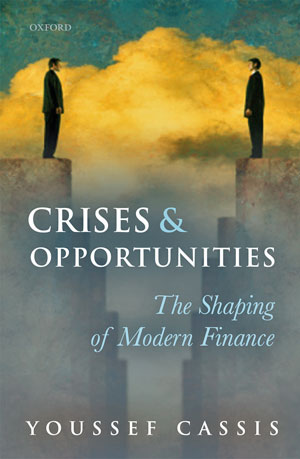
As the world’s political and economic leaders struggle with the aftermath of the financial debacle of 2008, this book asks: Have financial crises presented opportunities to rebuild the financial systems?
Given the violence of the shock, some fundamental questions have been raised about the working of the financial sector. Have banks become “too big to fail”? Should commercial banking be separated from investment banking? Have bonuses been responsible for the excesses leading to the crash? Should financial institutions be more tightly regulated? Will the financial sector shrink significantly in the foreseeable future? Will Wall Street and the City of London retain their world leadership or will they be upstaged by financial centers in Asia or the Middle East?
This book is an attempt to revisit the history of financial crises in the light of these very contemporary questions. Put another way: Financial crises have periodically undermined the financial world; have they also contributed to its reshaping?
Looking back at the global financial crises that have broken out since the late nineteenth century can help us understand what is happening today—the speed at which reforms are proceeding, the extent and limits of what is being achieved.
Crises and Opportunities examines five main issues. First, the banks themselves: Have big banks actually ever been allowed to fail? Second is governance, in particular bankers’ responsibility in times of crises. Third is regulation, its links with innovation, and the demand for deregulation and re-regulation. Fourth is international cooperation: the instinct of preservation which brings governments together when panic strikes, but the harder collective effort at improving the existing international financial architecture. Fifth is balance of power in international finance, reflected in no small way by the hierarchy of international financial centers.
History shows that many factors have contributed to the shaping of modern finance. Financial crises have been only one of them—and not necessarily the forces for change that we would like them to be in the wake of the debacle of 2008.
“Quantitative analyses inevitably lump rather than split, emphasize the commonalities rather than the specificities. In the case of major financial crises, whose occurrence is not very frequent, the differences, in other words the singularity of each event, are of paramount importance.”
The financial crisis of 2007-2008 triggered a huge demand for history, an unprecedented urge to place the event in a historical perspective.
Two questions came up time and time again. How serious is the current crisis compared with earlier ones? Can we learn lessons from earlier crises in order to recover from the current crisis and prevent new crises in future?
My book is part of the historians’ effort to meet this challenge and answer these questions.
My approach is primarily qualitative, unlike the far more quantitative This Time is Different: Eight Centuries of Financial Folly, published in 2009 by economists Carmen Reinhart and Kenneth Rogoff. I concentrate on a limited number, rather than on a vast database of financial crises.
Quantitative analyses inevitably lump rather than split, emphasize the commonalities rather than the specificities. In the case of major financial crises, whose occurrence is not very frequent, the differences, in other words the singularity of each event, are of paramount importance—the more so if one is to understand how the opportunities for change have, or have not been seized.
It is seldom realized that the financial debacle of 2008 has few parallels in history. If we consider its three main characteristics—a banking crisis, its taking place in advanced economies, and its carrying extremely high systemic risks—then only three other precedents can be identified.
The first is the panic that gripped the financial markets in late July and early August 1914. The entire financial system threatened to collapse. In fact, never before, and never again until September 2008, was the international financial system so near collapsing and in need of state intervention to rescue it. The causes, however, were different: the outbreak of a world war, not an uncontrolled financial boom.
The second parallel is 1929, despite striking differences with 2008: the stock market crash of 1929 was not responsible for the Great Depression, whereas the banking crisis of 2008 was clearly responsible for the Great Recession; the banking crises of the early 1930s, especially in Germany and the United States, were the consequence not, as in 2008, the cause of the economic crisis, though they contributed to aggravate the situation; and at no point was the global financial system on the verge of collapse. Yet 1929 remains the most severe economic crisis in modern history and as such the benchmark by which to measure all subsequent downturns.
The third parallel is the international debt crisis of 1982. Most of the world’s leading banks, primarily American, were seriously exposed and risked failure if Latin American countries, in the first place Mexico, Argentina and Brazil, were to default. An implosion of the financial system was averted under the guidance of the IMF: the banks rescheduled the debt and agreed to new loans and the Latin American countries accepted the IMF restructuring programs.
A few other crises put financial stability at risk: the Baring Crisis of 1890, when one of the City of London’s leading investment banks had to be rescued under the leadership of the Bank of England; the American Panic of 1907, when New York’s major trust companies had to be rescued under the leadership of J.P. Morgan. The end of the Bretton Woods system of fixed exchange rates was marked by the return of financial instability in the early 1970s. Several leading Japanese banks failed in 1997 and 1998, in the midst of the world’s second largest economy’s “lost decade.”
They only emphasize how exceptional an event the financial debacle of 2008 was. As a strictly financial crisis, it can be considered as the most severe in history: never before did so many leading banks, in so many advanced countries, find themselves at about the same time, in a situation requiring state intervention to avoid collapse.
The recent financial crisis must thus be put in a proper historical context to fully appreciate how much is at stake in the discussions taking place at both national and international levels about reshaping the financial system.
How far have bankers been held responsible for the outbreak of financial crises? Charles Baring, the first Lord Revelstoke, the firm’s senior partner, took the brunt of the Baring Crisis in 1890. He was blamed by his brother for his “insatiate vanity and extravagance.” He was liable for his entire fortune and he lost it. His house in Mayfair and his country estate in Devon had to be sold. Charles Barney, the President of the Knickerbocker Trust in New York, which suspended payment in October 1907 and triggered a financial panic, committed suicide a month later.
Wall Street’s leading bankers and financiers were pilloried during the Peccora investigation in 1933. To give but a single example: the total pay package of Charles Mitchell, the Citibank’s president, was revealed to exceed $1 million in 1929, when his basic salary was $25,000. Interestingly, questions were raised about “the propriety of permitting executives to share to such an extent the net earnings of financial institutions without having to bear any part of the losses,” and about the risk of a “lack of care in the handling and sale of securities to the public.”
Wall Street as a whole paid a heavy price for the crash, the banking crises and the depression—in terms of loss of prestige and loss of political influence. Banks and bankers were tamed for a generation. The contrast with 2008 is striking.
Responsibility cannot be entirely separated from ownership and control. Banks were the first companies, alongside railways, where ownership was separated from control—in the early to mid-nineteenth century. And yet big business in the financial world has never entirely freed itself from the dominance of private interests.
Private bankers remained highly influential in the world’s two leading financial centers—the City of London, with the merchant banks, and Wall Street, with the investment banks. The financial elite then made money with its own capital.
Merchant banks and investments banks remained partnerships until the 1960s. However, their conversion into public companies did not entirely eradicate some aspects of the partnership form of organization, especially earnings and professional status, which have persisted in the governance of the world’s leading banks, including the large universal banks into which some of them have been integrated.
On a far greater scale than ever before, top salaried executives and star traders have been able to enjoy a level of remuneration previously only attained by private bankers risking their own capital. That this state of affaires contributed to the financial debacle of 2007-2008 cannot seriously be doubted.
“Top salaried executives and star traders have been able to enjoy a level of remuneration previously only attained by private bankers risking their own capital. That this state of affaires contributed to the financial debacle of 2007-2008 cannot seriously be doubted.”
Reflecting on more than a hundred year of financial crises, it appears that few opportunities for re-shaping the financial system have actually been seized. This is because significant changes are only carried out in the wake of very serious crises, and such crises have been a fairly rare occurrence.
The most significant changes took place in the United States: the panic of 1907 was followed by the creation of the Federal Reserve in 1913. And the banking crises of the early 1930s led, amongst others, to the Glass-Steagall Act of 1933 separating commercial banking from investment banking.
Wars have played a greater impact on European finance, with World War II, in particular, leading to far higher a degree of state intervention in financial affairs.
It also appears that changes in the financial architecture have always been a compromise between economic necessity and political expediency.
The Federal Reserve System was duly put in place in 1913, yet political compromises impaired its efficiency and a wider-ranging reform allowing branch banking and interstate banking was not contemplated.
Equally, it is doubtful that the Glass-Steagall Act addressed the main causes of the banking crises that broke out between 1930 and 1933: most of the small banks that failed during these years were only commercial banks, while the large New York banks, which had securities affiliates, survived the crisis. On the other hand, the introduction of deposit insurance, in other words the government commitment to make banks safer for depositors, could justify a measure limiting risk taking.
This leads one to wonder if the financial crisis of 2007-2008 has been severe enough to be followed by a fundamental reform of the financial system—as well as the extent to which the implemented reforms will have been impaired by political motives, including banks’ lobbying.


Youssef Cassis is Professor of Economic History at the European University Institute, Florence. Besides Crises and Opportunities, featured in his Rorotoko interview, his books include City Bankers, 1890-1914 (Cambridge, 1994), Big Business: The European Experience in the Twentieth Century (Oxford, 1997), and Capitals of Capital: A History of International Financial Centres, 1780-2005 (Cambridge, 2006). Youssef Cassis cofounded the Financial History Review, is a member of the Academic Advisory Council of the European Association for Banking and Financial History, and past President of the European Business History Association.